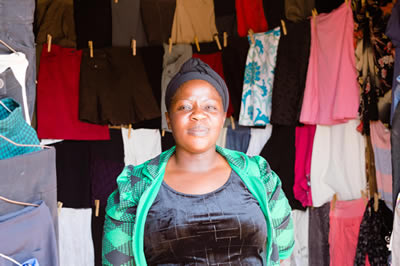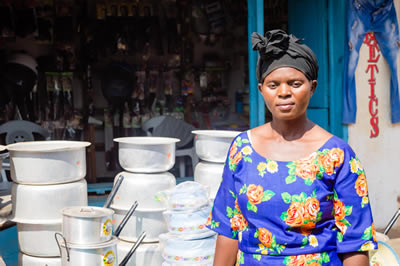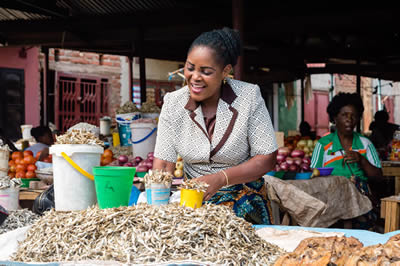UNCTAD travelled to half a dozen frontier communities in Malawi, Zambia and Tanzania to find out more about women living on the borderline.
Jane Phiri is a cross-border trader from Chipata, a city in Zambia near the border with Malawi.
She owns a small business selling second-hand clothes, known locally as salaula, from a clothing stall in the Chipata’s large regional market. She crosses into Malawi several times a week to source her merchandise – colourful ladies’ skirts and blouses – but Jane is an informal trader and moves her goods across borders through unofficial routes.
Jane, like tens of thousands of other small-scale traders in the region – eight out of ten of whom are women – would prefer not to have to smuggle her goods but finds the customs duties and the other taxes she must pay at the border too high and the rules too complex.

“I have to improve,” she says.
Like others, she doesn’t know much about a scheme run by the 19-country Common Market for Eastern and Southern Africa (COMESA), of which Malawi and Zambia are members, to ease trade for lone traders in certain goods.
“We are not fully sensitized,” Jane says. “We don’t know the people or even the offices to go to when we have arrived at the border.”
Lone traders
UNCTAD travelled to Malawi, the United Republic of Tanzania and Zambia to hear from nearly 200 women who eke out a subsistence living on the borderline – between countries, between legal and illegal trading, and often between providing for their households or not.
As most women cross-border traders are breadwinners, empowering them has a beneficial impact on their communities and on the prospects of coming generations.
“The purpose of the project is to see, on the one hand, the challenges that women face when they cross the border but also to look at what are the impediments that make their businesses very small with very little ‘value addition’,” UNCTAD’s director of trade and gender Simonetta Zarrilli said.
UNCTAD found that women like Jane have limited knowledge of customs rules and trade regimes but are at the same time forced to earn money this way for the good of their families.
Across many countries in sub-Saharan Africa it is estimated that women make up about 70–80% of informal cross-border traders.
The predominance of women in this work is often a result of constraints on their time and mobility, but also of reduced access to productive resources like land and financial resources like loans.
Lengthy clearance processes and weak governance at the border further contribute to make informal trade one of the few options available to women to earn a living in such areas.
Costly consignments
Like many other informal cross-border traders, Jane does not make much money and her takings are barely sufficient to support her family or pay for children’s school fees.
This prevents these women from not only to scaling-up their businesses beyond subsistence levels but also to formalizing them so that they comply with legal requirements.
Jane complains about lack of information regarding border requirements and paperwork she must complete. She also complains that the existing simplified trade procedures meant to facilitate small-scale trade are hardly brought to the attention of those who would benefit from them. Above all, she finds that the charges that are being imposed on small consignments are too costly.
Second-hand clothing represents a large share of goods traded informally in sub-Saharan Africa.
Yet, small-scale traders like Jane are not always aware that second-hand clothes are not on the list of products covered by simplified trade measures targeting small-scale traders, and therefore they are subject to high import duties.

Stella’s story
Stella Mumba is a cross-border trader from Mchinji, central Malawi, about 12 kilometres from Zambia.
“I’m doing kitchenware. It’s a very good business. It has more profit, especially here,” she says near her market stall piled high with pots and pans. “But it also has some challenges, like paying the taxes. The taxes are just very…high!”
Stella imports the saucepans and other kitchen items she sells from Zambia into Malawi – but finds the tariffs excessive.
“They charge us almost 32%, because they say that we trade some goods that they already have in Malawi,” she says. “So, there’s a challenge, especially at the border.”
This charge takes value added tax (VAT) and import duties together, but even for goods that pass the border duty free thanks to regional agreements the issue of high taxes remains.
However, like Jane, Stella meets this challenge by using an informal route over the border that doesn’t involve paying tariffs. She wants to know more so that she can import the goods she trades legitimately.
“Educate us to know the trade we are doing,” she says. “Help us to know more about what we should do to improve our business.”
Lucy Chikhawo, deputy station manager for the Malawi Revenue Authority says the border authorities are quite aware of the problems at the border, and the way certain traders avoid the customs by going across informal crossings.
“Talking about the kind of trade we experience as a station, there is formal trade for these small traders and then informal trade, which we know is higher than the formal kind of trade that we experience,” she says.
“This is because most of the traders are using the non-prescribed roads to smuggle these small items which they import from Zambia bypassing the normal border transactions. It impacts very much on the operations and the revenues that we collect as a station,” Ms. Chikhawo adds.
People will use it
Cross-border trader Mary Mgwingwa, who sells dried fish, knows all about problems on the borderline.
“I buy the fish all the way from Tanzania,” she says.
“The challenges I face mostly on the borders are the time it takes to clear our goods. Some people jump the border and use other routes. Then when we both bring our commodity to here in Zambia, the prices are very different because we use the border while others jump the border and sell their goods at lower prices while our prices increase because of the customs fee. Taking the advantage, those using the other routes will get to the market faster,” she says.

UNCTAD found that many women mix up customs duties and other taxes, mainly VAT, and sometimes customs officers take advantage of the confusion by charging customs duties that are not due.
But like the other women UNCTAD spoke to, Mary does not want to evade customs duties and is desperate to know how she can trade fairly.
“People should be told what the advantages of using the border are,” she says. “When people know what the advantages of using the border are, more people will use it.”
Ms. Chikhawo of the Malawi Revenue Authority agrees. She says that lack of knowledge is the key problem small-scale women traders face.
“There’s a facility that COMESA put in place, for COMESA members including Malawi, which these small traders, when they are importing or exporting goods from or into Malawi, can use: it’s called the Simplified Trade Regime (STR), whereby they can import these small consignments and enjoy not only lower rates of duties but also fast clearance,” she says.
“We find that most of these people are not using the facility, and, according to the information we have at hand, there is a lack of training. Most the Malawians, most of these small traders, are not aware of this STR facility and the benefits they can get from using it.”
Win-win for women
But Ms. Zarrilli of UNCTAD says that knowledge-building programmes would have a win-win outcome.
“Most of the women we interviewed are very unclear about what are the rules at customs and what they should do to cross the border formally in compliance with the rules,” she says.
This can lead to some women paying bribes to customs officials, Ms. Zarrilli says.
“We believe the United Nations should, on the one hand, help these women make their businesses more profitable, more sustainable and help them grow so that they have prospects for the future,” she says.
“But we also feel that it is important that the customs procedures are respected and that the governments get the earnings and revenues from this kind of trade.”
This is because least developed countries like Malawi, Zambia and Tanzania can ill afford to miss out on revenues their governments need for schools, roads and hospitals. And by formalizing their operations, small-scale women traders would gain better access to credit and other services they need to build better businesses.
With its activities on informal and small-scale cross-border trade, UNCTAD aims to support traders like Jane, Stella and Mary at selected border crossings across Tanzania, Malawi and Zambia so that they can acquire awareness about existing trade measures and regulations, as well as to strengthen their entrepreneurship skills. The project can facilitate dialogue between cross-border traders and their trade associations, border agencies and trade ministries in the three countries.
This will help to make women cross-border traders' businesses more profitable and sustainable while making cross-border trade in general more efficient and less cumbersome.
It’s a win-win for all.


